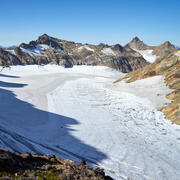Landscape Science
Landscape Science research focuses on the integration of field studies, remote sensing observations, and modeling to characterize and document landscape changes occurring in terrestrial, aquatic, and coastal ecosystems in Alaska. Our research describes underlying environmental conditions and change which provide the fundamental understanding necessary for predicting future conditions.




